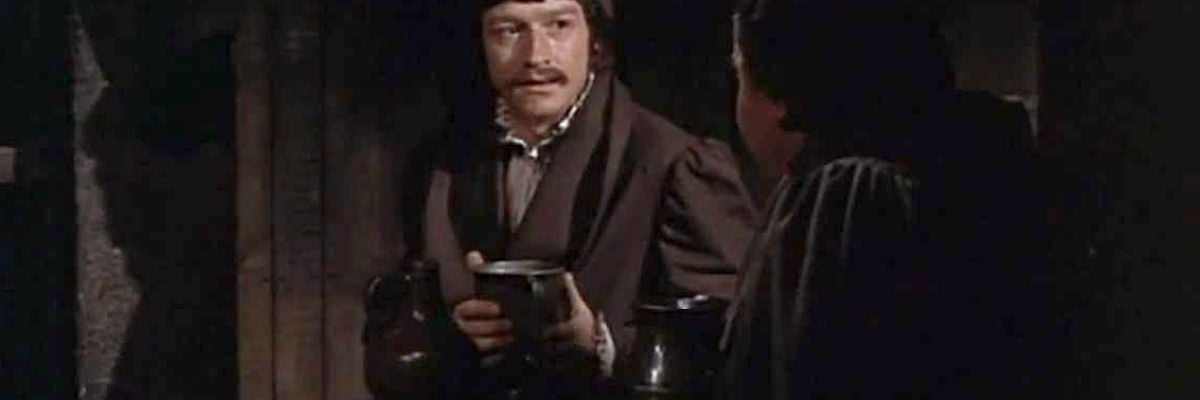
Acclaimed British actor Sir John Hurt died over the weekend after a battle with pancreatic cancer. Young readers may know him as Ollivander in the Harry Potter film series. Relatively older readers will likely remember him for his Oscar-nominated lead role in The Elephant Man or his shocking encounter with an extraterrestrial in Alien. But for me—and, I suspect, many other Catholics—most memorable is Hurt’s outstanding portrayal of Richard Rich (pictured above), the young man who to advance his political ambitions betrayed St. Thomas More in the classic A Man for All Seasons.
Hurt’s portrayal of Rich in this Academy-Award–winning film—six Oscars in all, including Best Picture for 1966—was his breakout role as a young actor, as the BBC reports. And the movie provides great moral lessons as Hurt’s Richard Rich interacts with Thomas More, played by Paul Scofield in an Oscar-winning role.
Political ambitions
Rich has a background in education, but he desires a political post for the fame and power it could bring him. More realizes this and won’t recommend him when the Duke of Norfolk, early in the movie, cuts to the chase on More’s assessment of Rich for a place at Henry VIII’s royal court. But More still wants to help Rich and offers him a teaching post that includes a home and a servant.
It’s a defining scene that runs slightly less than three minutes. Rich is deflated, even though More tells him that he’d be “a fine teacher. Perhaps a great one.”
“lf I was, who would know it?” Rich responds, betraying his insecurity and misguided ambition.
“You,” responds More. “Your pupils. Your friends. God. Not a bad public, that.”
More counsels Rich that “a man should go where he won’t be tempted,” but he can’t dissuade the young man. Yet Rich seeks to soothe his troubled conscience, as he wants the morally upright More to bless his designs, not the Machiavellian Cromwell, King Henry VIII’s “very able” and loyal henchman who has “promised he’ll do something” for Rich.
Rich gets his place at court as collector of revenues for York, but the price he pays is a high one: agreeing to collude with Cromwell and say that More took a bribe in serving as chancellor of England. That endeavor fails, but meanwhile Henry has broken with the pope, requiring his subjects to recognize him as “supreme head of the Church in England.” Why? The pope will not recognize the king’s invalid remarriage to Anne Boleyn following his divorce from Queen Catherine of Aragon, who could not provide him a royal heir (several of their sons were stillborn or died within a month after birth).
Lost innocence
Despite ascending to the royal court, Rich is downcast as he ponders the personal cost.
“It’s a bad sign when people are depressed by their own good fortune,” Cromwell says.
“I’m not depressed,” Rich says in another telling scene (7:30ff.).
“You look depressed,” Cromwell says.
“I was lamenting,” Rich responds. “I’ve lost my innocence.”
“Some time ago,” Cromwell says. “Have you only just noticed?”
Virtue breeds virtue and vice breeds vice. Indeed, Rich’s betrayal of More has been sometime in the making, a reminder to everyone to nip bad habits in the bud.
“There. That wasn’t too painful, was it?” Cromwell asks when Rich completes his embrace of grave moral evil.
“No,” Rich says.
“No,” Cromwell agrees. He then utters one of the film’s most profound lines: “And you’ll find it easier next time.”
If we allow vice to take hold in our lives, not only will we develop bad habits, but choosing wrongdoing will also become easier, while repenting and doing the right thing will become more difficult. Rich is gradually extinguishing the light of his conscience.
“The eye is the lamp of the body,” Jesus says in the Sermon on the Mount, right after saying not to “lay up for yourselves treasures on earth.” “So, if your eye is sound, your whole body will be full of light; but if your eye is not sound, your whole body will be full of darkness. If then the light in you is darkness, how great is the darkness!” (Matt. 6:22-23; emphasis added).
A final betrayal
More will not recognize the king’s schism and heresy, so he too must pay a price, resigning his position as Henry’s chancellor. More has to dismiss his many servants because he is no longer “a great man” in the eyes of the world and therefore can’t afford them.
But More is serene about his professional loss, pledging to find new employment for all of his servants, because he still has many “great men” among his friends. Unlike Rich, More’s greatness is rooted in Jesus Christ. As the second reading for the Fourth Sunday in Ordinary Time affirms to us in a timely manner, More’s “boast,” his sense of self-worth, is firmly “in the Lord” (1 Cor. 1:26-31).
Ultimately, Rich perjures himself so that can More can be convicted of high treason for allegedly denying Henry’s ecclesiastical supremacy in England. For this further betrayal, More learns, Cromwell has appointed Rich attorney general of Wales.
In a last effort to get his former friend to repent, More quotes Christ in the film’s climactic scene (3:30ff.): “Why Richard, it profits a man nothing to give his soul for the whole world [Matt. 16:26]. But for Wales?”
Rich eventually became chancellor of England, a film-ending narrator says, “and died in his bed.” Meanwhile, More died a martyr’s death, because, as he said before his beheading, “I die his majesty’s good servant but God’s first.”
Let us pray for the repose of the souls of both John Hurt and Richard Rich, asking the intercession of St. Thomas More.



